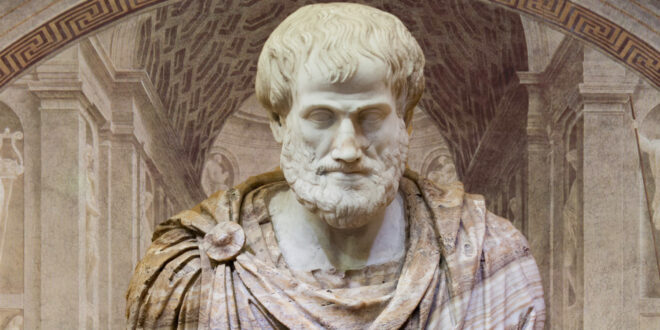Aristotle (384 BC – 322 BC) was a Greek philosopher, a student of Plato and teacher of Alexander the Great. His writings cover many subjects, including physics, metaphysics, poetry, theater, music, logic, rhetoric, politics, government, ethics, biology, and zoology. Together with Plato and Socrates (Plato’s teacher), Aristotle is one of the most important founding figures in Western philosophy. Aristotle’s writings constitute a first at creating a comprehensive system of Western philosophy, encompassing morality and aesthetics, logic and science, politics and metaphysics. The image shown, left, is from a Rembrandt painting of Aristotle
~~~~~~~~~~~~~~~~~~~
“For what is the best choice, for each individual is the highest it is possible for him to achieve.” — Aristotle (384 BC – 322 BC)
“Most people would rather give than get affection.” — Aristotle (384 BC – 322 BC)
“Anybody can become angry – that is easy; but to be angry with the right person, and to the right degree, and at the right time, and for the right purpose, and in the right way – that is not within everybody’s power and is not easy.” — Aristotle (384 BC – 322 BC)
“The coward calls the brave man rash, the rash man calls him a coward.” — Aristotle (384 BC – 322 BC)
“How God ever brings like to like.” — Aristotle (384 BC – 322 BC)
“The wise man does not expose himself needlessly to danger, since there are few things for which he cares sufficiently; but he is willing, in great crises, to give even his life–knowing that under certain conditions it is not worth-while to live.” — Aristotle (384 BC – 322 BC)
“Dignity consists not in possessing honors, but in the consciousness that we deserve them.” — Aristotle (384 BC – 322 BC)
“The roots of education are bitter, but the fruit is sweet.” — Aristotle (384 BC – 322 BC)
“Those who educate children well are more to be honored than parents, for these only gave life, those the art of living well.” — Aristotle (384 BC – 322 BC)
“All who have meditated on the art of governing mankind have been convinced that the fate of empires depends on the education of youth.” — Aristotle (384 BC – 322 BC)
“The educated differ from the uneducated as much as the living from the dead.” — Aristotle (384 BC – 322 BC)
“The roots of education are bitter, but the fruit is sweet.” — Aristotle (384 BC – 322 BC)
“Those who educate children well are more to be honored than parents, for these only gave life, those the art of living well.” — Aristotle (384 BC – 322 BC)
“Education is an ornament in prosperity and a refuge in adversity.” — Aristotle (384 BC – 322 BC)
“Equality consists in the same treatment of similar persons.” — Aristotle (384 BC – 322 BC)
“We are what we repeatedly do. Excellence then is not an act but a habit.” — Aristotle (384 BC – 322 BC)
“A friend is a second self.” — Aristotle (384 BC – 322 BC)
“Friendship is a single soul dwelling in two bodies.” — Aristotle (384 BC – 322 BC)
“There is no great genius without a mixture of madness.” — Aristotle (384 BC – 322 BC) [Lat., Nullum magnum ingenium sine mixtura dementia.]
“No great genius is without an admixture of madness.” — Aristotle (384 BC – 322 BC)
“There are some who, because the point is the limit and extreme of the line, the line of the plane, and the plane of the solid, think there must be real things of this sort.” — Aristotle (384 BC – 322 BC)
“Man is a goal seeking animal. His life only has meaning if he is reaching out and striving for his goals.” — Aristotle (384 BC – 322 BC)
“It is easy to perform a good action, but not easy to acquire a settled habit of performing such actions.” — Aristotle (384 BC – 322 BC)
“It is well to be up before daybreak, for such habits contribute to health, wealth, and wisdom.” — Aristotle (384 BC – 322 BC)
“To live happily is an inward power of the soul.” — Aristotle (384 BC – 322 BC)
“Dignity consists not in possessing honors, but in the consciousness that we deserve them.” — Aristotle (384 BC – 322 BC)
“Hope is a waking dream.” — Aristotle (384 BC – 322 BC)
“Of mankind in general, the parts are greater than the whole.” — Aristotle (384 BC – 322 BC)
“Wit is cultured insolence.” — Aristotle (384 BC – 322 BC)
“It is not once nor twice but times without number that the same ideas make their appearance in the world.” — Aristotle (384 BC – 322 BC)
“If at first the idea is absurd, then there is no hope for it.” — Aristotle (384 BC – 322 BC)
“You ask me if I keep a notebook to record my great ideas. I’ve only ever had one.” — Aristotle (384 BC – 322 BC)
“No excellent soul is exempt from a mixture of madness.” — Aristotle (384 BC – 322 BC)
“Justice is that virtue of the soul which is distributive according to desert.” — Aristotle (384 BC – 322 BC)




